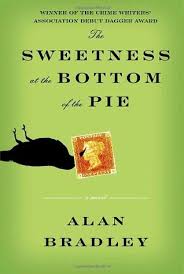A krimi with energy, wit, chemistry, zest, and pigtails. It starts and ends with our heroine Flavia de Luce bound and gagged. As if that could stop this dynamo.

It is rural England of 1950. Flavia with her older sisters Ophelia and Daphne lives with Father in the crumbling estate of Buckshaw. Ophelia and her co-conspirator Daphne delight in tormenting Flavia who reciprocates with chemistry.
Unwisely stepping into this combat zone of sibling rivalry are a pair of villains who seek postage stamps. Yes, they want to send cards home to mum with Penny Blacks!
Father came back from the war a colonel with Dogger, the handy man, and both are largely silent. Dogger had been a POW on the Burma Railroad, and he goes blank now and again. The Colonel spent four years in Changi.
Father’s wife, mother of the girls, Harriet disappeared and then died. As the story opens Father spends most of his time with stamp albums.
Flavia does chemistry upstairs in a laboratory fitted out and left by a remote forbear. Daphne reads, often aloud, from the English classics lining the decrepit shelves, and Ophelia, the oldest at 17, preens constantly in the reflections of tea spoons, mirrors, water glasses, windows. She knows who is the fairest of them all and wants to know it constantly.
Then at 4 am one morning, while waiting for an experiment to percolate, Flavia comes across a dead man in the cucumber patch! Zounds! What to do? There are many house rules against ever intruding on Father and they would likely involve capital punishment at 4 am. Dogger, then. Yes, and for a man more of less comatose he proves very practiced at dealing with the dead. Flavia reflects on the fragments she has heard about him.
Plod arrives and dismisses the ‘little girl’ Flavia with a wave. Big mistake. That sets her off on her own mission. She tries to figure it out like a problem in chemistry: identify the interactions, resolve the components, assess the intensity, and so on. She interviews neighbours ever so subtly, researches in the county library, examines parish church tombstones, walks the woods for time and distances, talks to the old school tie, climbs on roofs, and more, all with the obsessiveness only a tweenager can muster. Meanwhile Dogger confesses to shield Father who confesses to shield Dogger, and Flavia, what else is a chemist to do to buy time for maturation, confesses to shield them both.
Then there is the itinerant architectural researcher tramping about. Is he really what he seems? Or did he come from Norway? Who ate the slice of cream pie? Why was the dead bird left on the back door step? Why is the county library closed just when essential information has to be found?
This title is the first in a series, and it is a delight. The erudition spills off the page with vitality. The learning is immense but the load is light as air. Flavia’s constant resort to chemistry provides the pole star. The plotting is meticulous and integrates everything. There is nothing superfluous. Every detail dovetails into the plot like Shaker furniture joined without a nail.
The denouement does drag on, but it works a delight when comes salvation in white. Loved the convoluted chain of reasoning that Flavia developed to arrive at Norway, matched to that of Plod who found it on a clothing tag.

Alan Bradley is a Canadian with many writing credits. There seem to be nine in this series to date.
Skip to content
